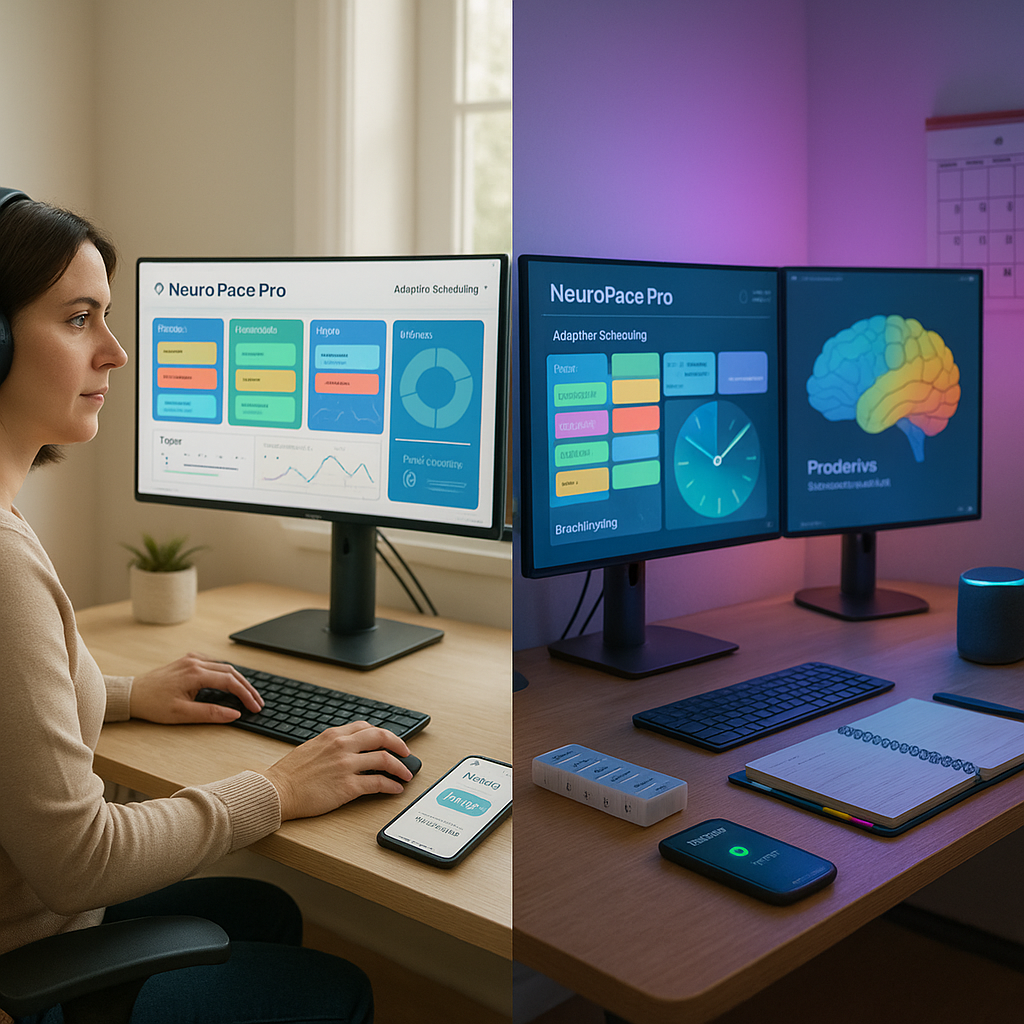Key Takeaways
-
Diagnosis as a turning point: rewriting your story, not just your to-do list:
A late ADHD diagnosis can transform decades of confusion and self-doubt into a clearer narrative, revealing that survival strategies (often mistaken for personal failures) were actually adaptive responses. This self-awareness invites adults to reinterpret their past with new clarity and self-compassion. -
From frustration to self-forgiveness: reclaiming your emotional narrative:
Understanding one’s neurodivergence can dissolve persistent shame and guilt, paving the way for self-acceptance. Adults gain permission to grieve lost time while also celebrating the unique strengths that were previously hidden by undiagnosed ADHD. -
Relationship dynamics: connection deepens with shared understanding:
Sharing a late ADHD diagnosis can lead to more honest conversations, greater empathy, and healthier boundaries in relationships. This openness allows loved ones to connect more deeply and support you as your genuine self. -
Career recalibration: redefining success on your own spectrum:
Recognizing how ADHD shapes behavior enables adults to reimagine their work environment and habits, reducing burnout and fostering authentic contribution. This process often uncovers new pathways for professional growth and satisfaction. -
Hidden superpowers unearthed: creativity and resilience come into focus:
The moment of diagnosis doesn’t just highlight past struggles. It uncovers a toolkit of resourcefulness, adaptability, creativity, and big-picture thinking that can flourish once self-judgment fades. -
Integration, not erasure: becoming whole by embracing neurodivergent identity:
True acceptance goes beyond seeking a “cure” or masking symptoms. Instead, it involves honoring all parts of oneself, weaving together past experiences and present understanding into a vibrant, empowered identity.
Exploring the lived reality of a late ADHD diagnosis brings hope, validation, and actionable wisdom.
In the following sections, we’ll delve into the emotional, relational, and professional transformations that arise from embracing your neurodivergent brilliance and reclaiming your story.
Introduction
Discovering you have ADHD as an adult is more than an update to your medical chart.
It often feels like rewriting your entire life’s narrative. Suddenly, recurring challenges and idiosyncrasies are no longer arbitrary failures but clues that make sense, bringing a new lens that reframes years of self-blame and confusion.
For many, a late ADHD diagnosis triggers a significant shift in identity.
It calls for compassion toward the past, inspires bravery in relationships, and empowers adults to define success on their own terms. Far from being an endpoint, this discovery marks the beginning of healing. Hidden strengths and unique perspectives finally have space to shine.
We’ll explore how embracing a late ADHD diagnosis transforms frustration into forgiveness, nurtures deeper connections, and sparks new possibilities.
Consider it a reminder that your story is vibrant, worth telling in bold color, and absolutely deserves to move out of the overlooked margins.
The Emotional Impact of Late Diagnosis
The revelation of an adult ADHD diagnosis is rarely just clinical.
It marks an existential turning point. After years or even decades navigating unexplained challenges, this confirmation unleashes a powerful wave of emotions: relief, sadness, anger, and eventually, acceptance.
The Relief of Recognition
For most adults, the immediate aftermath of diagnosis is a deep sense of relief. This feeling extends far beyond mild comfort. It is often an intense, cathartic release. Decades of “trying harder” or feeling “not enough” suddenly become understandable.
“When my doctor said ‘You have ADHD,’ I burst into tears right there in the office,” recalls Maya, diagnosed at 38.
“It wasn’t sadness. It was as if someone finally handed me the missing puzzle piece.”
So why is this relief so profound?
- Past struggles are revealed as biological differences, not character defects.
- The endless effort to meet expectations suddenly makes sense.
- Feeling “different” is validated as real, not imagined.
This validation often erases years of internalized shame.
As another newly diagnosed adult shared, “I wasn’t broken or lazy. My brain just worked differently.”
Grief for Lost Time and Potential
With relief often comes grief.
For adults diagnosed late in life, there is a deep mourning for what could have been; lost opportunities, misunderstood potential, and alternate paths never taken.
This grief can show up in several ways:
- Regret over academic achievements hindered by undiagnosed ADHD
- Rethinking abandoned career ambitions that felt impossible to sustain
- Pain over relationships strained by misunderstood behaviors
- Sorrow for the “what if” version of life where diagnosis came sooner
“I kept thinking about college,” says James, diagnosed at 42. “If I’d had accommodations, everything might have looked different. There’s this alternative life I’ll never live.”
This grief is non-linear, recirculating at milestones or transitions.
Processing these emotions is crucial for moving forward, even as waves of anger, sadness, or frustration reappear over time.
Anger and Resentment About Delayed Recognition
For many, anger and resentment accompany grief. This is often directed toward systems or individuals who overlooked their struggles.
Anger may emerge toward:
- Healthcare providers who misdiagnosed, dismissed, or ignored symptoms
- Schools or workplaces that labeled them as careless or unmotivated
- Parents or caregivers who missed the signs or misunderstood behaviors
- Society at large for perpetuating harmful myths about ADHD
“I spent decades being told I was lazy and unmotivated,” shares Tara, diagnosed at 36.
“Therapists focused on my anxiety but never considered ADHD. It’s hard not to feel bitterness.”
This anger is a natural step on the path to acceptance.
Naming the harms of delayed diagnosis is validating. However, staying stuck in resentment can impede the process of healing. As individuals work through anger, many discover new motivation to advocate for neurodivergent communities and prevent others from facing similar barriers.
Reconciling Past and Present Self
Receiving an ADHD diagnosis as an adult requires an extensive revision of your life story.
It’s not simply reflecting on the past. It becomes a transformative act of rewriting your narrative with newfound self-awareness.
Reinterpreting Life Events Through the ADHD Lens
Following diagnosis, adults often experience a cascade of “aha” moments as they re-examine significant life events.
This reframing may include:
- Acknowledging past academic struggles as the result of executive dysfunction, not lack of intelligence
- Connecting relationship misunderstandings to time blindness or distractibility
- Noting how heightened sensitivity or emotional intensity shaped social experiences
- Recognizing how impulsivity or hyperfocus influenced major decisions
“It was like watching my life with the director’s commentary on,” says Alex, diagnosed at 41.
“Suddenly, patterns made sense. Impulsive job switches, forgotten birthdays. Everything clicked.”
This process fosters a more honest and compassionate appraisal of one’s journey. Every recollection becomes an opportunity to reinterpret hardship as a reflection of neurological reality rather than personal failure.
Integrating Pre- and Post-Diagnosis Identities
Blending your new understanding with your long-held sense of self can be both liberating and disorienting.
The process isn’t about discarding your pre-diagnosis self. Instead, it’s about honoring how you’ve navigated life so far and determining how this new knowledge informs your path forward.
Adults may find themselves:
- Distinguishing between innate personality traits and ADHD coping mechanisms
- Realizing strengths and talents forged through navigating adversity
- Letting go of internalized criticism and adjusting expectations
- Choosing what accommodations or supports enhance their life
“Before my diagnosis, I thought being ‘the spontaneous friend’ defined me,” shares Jamie, diagnosed at 35.
“Now, I see it as a mix—true to my spirit, shaped by my brain. Today, I embrace structure, but I don’t lose the joy of spontaneity. I just understand where it comes from.”
Identity integration means allowing both before-and-after versions of yourself to coexist, forging a narrative where neurodivergence is part of your foundation, not a footnote.
Moving From Self-Blame to Self-Understanding
Perhaps the deepest transformation comes from shifting away from chronic self-blame. Many adults internalize a critical inner voice, conditioned by years of struggling to meet invisible standards.
The journey toward self-understanding includes:
- Recognizing how ableism and stigma shaped self-perception
- Distinguishing between what requires adaptation and what is a fixed trait
- Nurturing compassion for your past self who survived without answers
- Building new standards anchored in acceptance, not perfectionism
“I always heard ‘try harder,’” admits Leila, diagnosed at 39.
“After my diagnosis, I started saying, ‘I’m playing the same game as everyone else, but with a different controller.’ That realization brought self-kindness.”
This evolution doesn’t mean avoiding responsibility. It’s about choosing growth and accommodation over shame and unrealistic pressure, aligning your goals and expectations with your actual brain and needs.
Rebuilding Relationships After Diagnosis
A late ADHD diagnosis doesn’t just transform self-perception; it profoundly impacts relationships.
Pre-diagnosis dynamics may shift as everyone involved adjusts to the new framework that diagnosis provides.
Explaining Your Diagnosis to Loved Ones
Effectively communicating your diagnosis is both an initial hurdle and an ongoing process. It involves not just disclosure, but education and empathy.
Best practices often include:
- Providing concrete examples of how ADHD impacts day-to-day life
- Connecting specific relationship friction points to ADHD traits or behaviors
- Using clear, relatable metaphors to translate your experience
- Sharing reputable resources tailored to partners, parents, or friends
“I wrote my wife an ‘owner’s manual’ for my brain,” explains Marcus, diagnosed at 43.
“When I explained why transitions are hard and that multitasking can overwhelm me, it suddenly made sense to her.”
The explanation won’t be a one-time event.
As your own understanding grows, so will your conversations and requests for support and accommodation. Building this dialogue helps make relationships more resilient and deeper.
Navigating Changed Relationship Dynamics
Diagnosis often triggers temporary imbalance as roles and expectations recalibrate. While this adjustment may bring discomfort, it sets the stage for more authentic and mutually supportive bonds.
Relationships often benefit from:
- Renegotiating responsibilities or routines to reduce misunderstandings
- Developing bespoke communication strategies that consider ADHD processing styles
- Addressing and clearing up old resentments rooted in pre-diagnosis misunderstandings
- Balancing accountability with empathy, forging a partnership where both needs matter
As new frameworks replace old assumptions, relationships strengthen through honesty and mutual adjustment.
Partners, families, and friends who support your growth can become allies in building an ADHD-friendly environment that honors everyone’s well-being.
Beyond the Personal: ADHD Diagnosis and Professional Reimagining
While ADHD diagnosis dramatically transforms personal narratives and relationships, its implications ripple out into professional life as well.
Unpacking work habits and redefining productivity can open doors across industries, from technology to healthcare, education, legal, and creative fields.
For neurodivergent professionals:
- Self-knowledge enables tailored accommodations, reducing burnout in high-pressure workplaces
- Unique ADHD strengths (such as rapid problem-solving, creative lateral thinking, and adaptability) can shine in fields like entrepreneurship, marketing, and environmental science
- Understanding sensory needs or attention fluctuations helps educators design more inclusive classrooms, while healthcare and finance professionals can develop better systems for managing complex information
- Legal professionals can leverage risk-awareness and innovative solutions in compliance contexts, while retail and consumer fields can benefit from big-picture strategizing
Career recalibration is about crafting new metrics for success.
This means defining achievement and satisfaction through a neurodivergent lens, not by inherited neurotypical standards.
Conclusion
Receiving an ADHD diagnosis in adulthood is not merely a label; it is a catalyst for profound transformation.
It invites individuals to rewrite their personal, relational, and professional stories with clarity, self-compassion, and purpose. Relief intermingles with grief and anger as misunderstood years are finally explained and honored. This journey of integration allows adults to move from self-blame to authentic understanding, forging deeper relationships built on transparency and empathy.
Looking to the future, those who embrace and integrate their neurodivergent identities are poised not simply to adapt but to excel. By redefining success on their own terms and leveraging strengths uncovered by diagnosis, neurodivergent adults turn what was once perceived as a limitation into a wellspring of innovation and resilience. The real challenge moving forward is not just to accept this new narrative, but to lead with it. Create environments, careers, and communities where different minds are not only included but celebrated.
In this new chapter, thriving is possible because of, not despite, a neurodivergent brain.





Leave a Reply